In this article:
The green cousin of cauliflower, broccoli has gained a lot of limelight in the health and fitness field. They both belong to the cruciferous Brassicaceae family and share a lot of phytochemicals. (1)
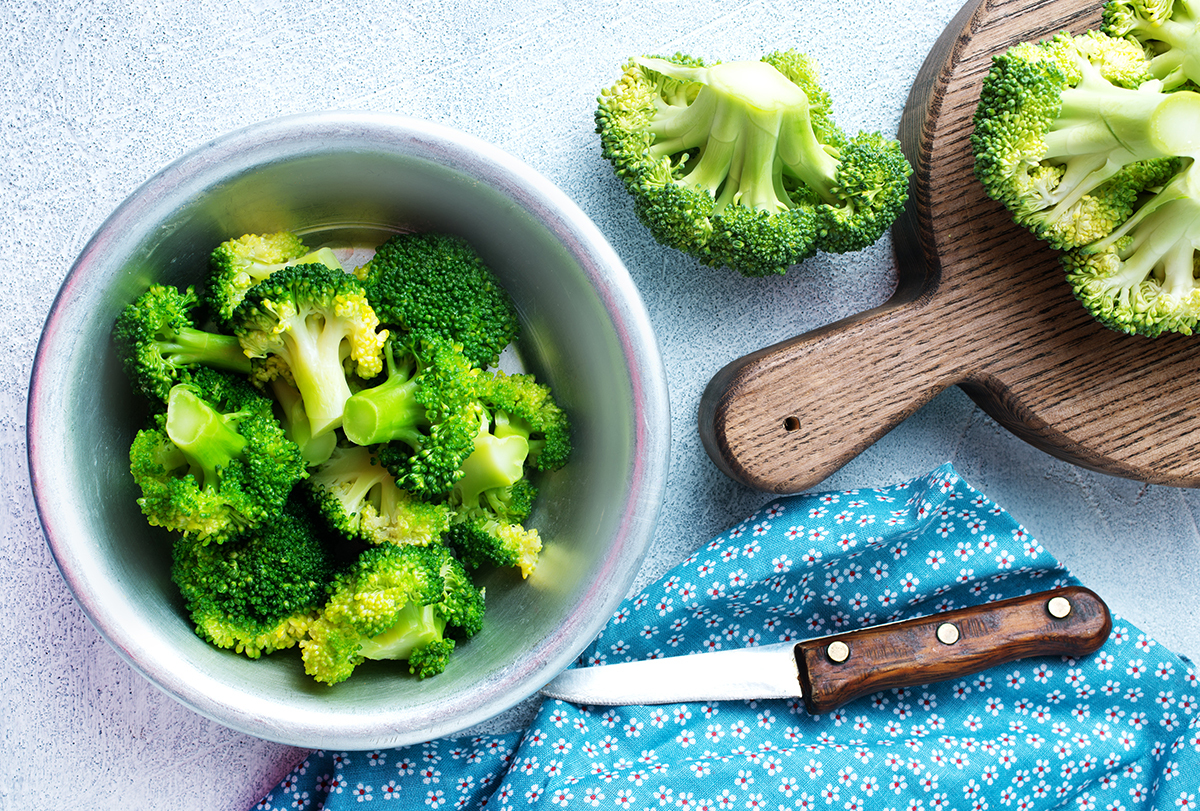
This versatile vegetable is used in a variety of dishes cooked or raw, and it contains several nutrients that lend it its many health benefits.
Nutritional Composition of Broccoli
Just 100 g of broccoli provides 35 calories, 7.2 g of carbohydrates, 3.3 g of fiber, and 89.3 g of water. (2)
It is rich in many vitamins including vitamin C (64.9 mg, which contributes 108% of the recommended daily intake), vitamin K (141 mcg, which contributes to 176% of the recommended daily intake), vitamin B6 (0.2 mg), and folate (108 mcg). (2)
It is also a rich source of minerals including potassium (293 mg), sodium (262 mg), manganese (0.2 mg), and selenium (1.6) mcg. (2)
In addition, broccoli also has several antioxidants, polyphenols, glucosinolates, beta carotene, quercetin, kaempferol, and sulforaphanes. (3) Together these compounds make broccoli a powerhouse of health.
Top 10 Health Benefits of Broccoli
Here are some of the health benefits of eating broccoli.
1. Lowers cholesterol levels
Eating broccoli as part of a healthy diet can help lower cholesterol levels and balance the good and bad cholesterol.
The glucosinolates in broccoli produce a compound called isothiocyanate, which is known to reduce cholesterol in the blood. (4)
In one study, consumption of 400 g of broccoli per week for 12 weeks resulted in a reduction of cholesterol in the blood. (4)
In another study, patients with type 2 diabetes were given 10 g of broccoli sprout powder daily. It reduced their serum triglycerides and improved their ratio of good cholesterol. (5)
Thus, having close to one head of broccoli per week as part of a healthy balanced diet can be a good way to balance blood cholesterol.
2. Manages and controls diabetes
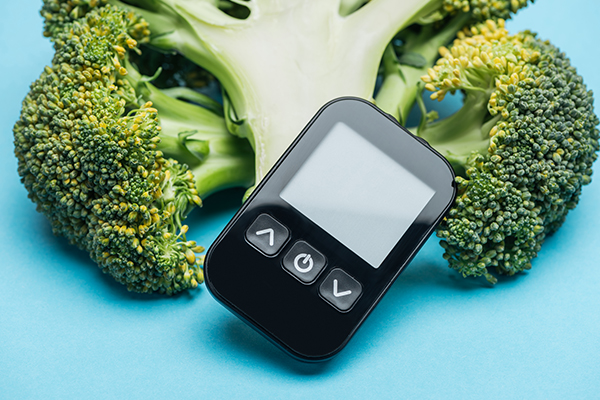
There is some evidence to suggest that the glucoraphanin in broccoli can influence obesity and insulin resistance.
One study revealed that consumption of 10 g of broccoli sprout powder each day improved insulin resistance in people with type 2 diabetes, decreasing their free insulin in the blood. (6)
Moreover, recent animal studies indicated that broccoli florets and stalks improved insulin sensitivity, resulting in lowered insulin in the blood. It also reduced the inflammation associated with diabetes. (7)
3. Protects the heart
Hypertension, or high blood pressure, is a major risk factor for heart diseases and kidney malfunction. It continually represents a growing public health concern all over the world. (8)
One of the main causes of heart diseases such as high blood pressure, atherosclerosis (accumulation of fat within the blood vessels), stroke, and heart attack is oxidative stress. The sulforaphanes found in broccoli act as an antioxidant to protect the heart. (9)
Sulforaphanes also reduced the fatty plaques in the blood vessels, reducing the risk of strokes and high blood pressure. (9)
Studies done on a large group of nurses showed that consumption of broccoli was associated with a lower risk of hypertension as well. (8)
4. Aids healthy digestion
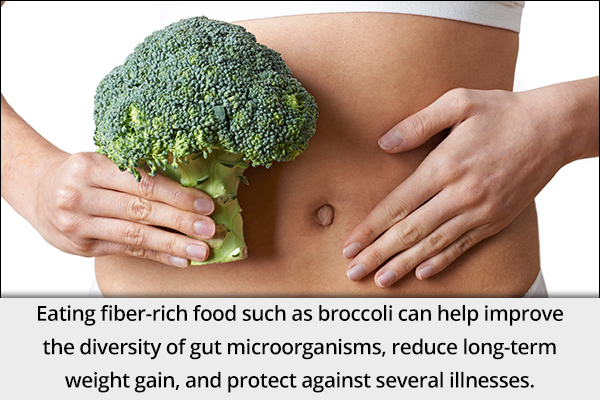
Eating fiber-rich food such as broccoli can help improve the diversity of gut microorganisms, reduce long-term weight gain, and protect against several illnesses. Broccoli also adds bulk to the stool, allowing its easy passage along the colon. (10)
Reviews of studies have shown that the sulforaphane and glucoraphanin in broccoli improved the passing of stools. (11)
5. Slows aging in the brain
A study of 960 people aged 58–99 years showed that consumption of vegetables that are rich in vitamin K and kaempferol such as broccoli may improve cognitive decline associated with aging. (12)
Some animal studies also found that the kaempferol from broccoli had a protective effect against brain injury and inflammation of neurons following a stroke. (13)
Consume one serving of broccoli each day to keep your brain healthy and active.
6. Acts as an antiaging agent
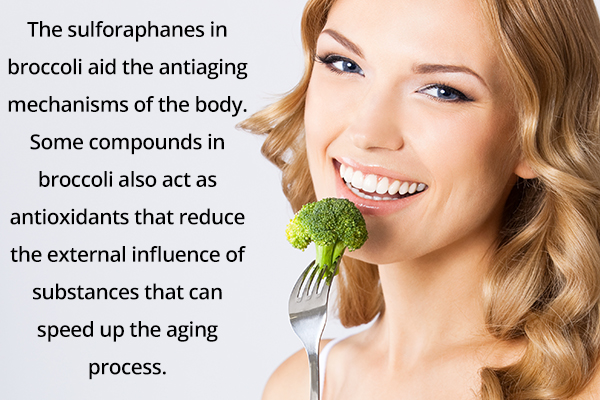
Though aging is a normal occurrence, oxidative stress and changes within the body can speed up this process. (14)
The sulforaphanes in broccoli aid the antiaging mechanisms of the body. Some compounds in broccoli also act as antioxidants that reduce the external influence of substances that can speed up the aging process. (15)
7. Supports healthy immunity
Broccoli supports a healthy immune system by supplying the body with vitamin C and sulforaphanes.
Sulforaphanes stimulate an immune response to kick-start the antioxidant and anti-inflammatory responses within the body. This mechanism is crucial to ensure infection-causing bacteria cannot survive within cells. (16)
Additionally, vitamin C supports immunity by increasing the activity of cells involved in immune responses. It can both prevent and treat some types of infections.
Just 200 g of broccoli can provide enough vitamin C to act as a protective agent. (17)
8. Supports healthy bones
Broccoli contributes to bone health through its vitamin K and sulforaphane content.
Vitamin K is involved in many processes in regenerating healthy cells of the bones. (18)
Sulforaphanes, on the other hand, contribute to bone health by destroying the cells responsible for degenerating cartilage in joints. (19) This function is important in the management of conditions such as osteoarthritis, as it is primarily a result of wear and tear of the cartilage between joints.
Though evidence and trials are limited on the contribution of broccoli to bone health, it is already known that consumption of broccoli may help support healthy bones.
9. May protect against UV-induced sun damage

Sulforaphanes have been recently investigated for their role against sun damage. They act as antioxidants and encourage cells to heal. (20)
One study found that broccoli extracts when fed to hairless mice prevented the formation of tumors following prolonged exposures to UV rays. (21) This finding warrants more research in the prevention of UV-induced skin cancer.
10. May be cancer protective
The role of broccoli sulforaphanes is heavily discussed. These compounds increase the activity of the liver to tackle the cancer-causing potential of foods consumed.
They also cause death of cancer cells, reduce their growth, and prevent them from spreading. They have antimicrobial and antioxidant capacities and also make sure healthy cells are growing and multiplying without defects. (22)
Though FDA-approved sulforaphane supplements are not yet available, the current information has prompted further research to explore the potency of sulforaphanes in the prevention of cancer.
How to Consume
Broccoli can be consumed stir-fried, baked, grilled, steamed, or boiled. It can be added to salads, main meals, soups, or side dishes.
Precautions to Consider
It might be tempting to consume large amounts of broccoli for its health benefits, but consider these things first to avoid unpleasant side effects: (22)
- Eating large quantities of broccoli can cause hypoglycemia in people with diabetes.
- Side effects that include nausea, gastric irritation, IBS, and diarrhea have been reported.
- The isothiocyanates in broccoli block the uptake of iodine, which is harmful in the case of people with hypothyroidism.
- Overconsumption can lead to lower blood pressure.
- People consuming blood thinners need to be wary of excessive consumption of broccoli as the vitamin K in it can cause a bleeding risk.
Most-Asked Questions About Broccoli
When should I not eat broccoli?
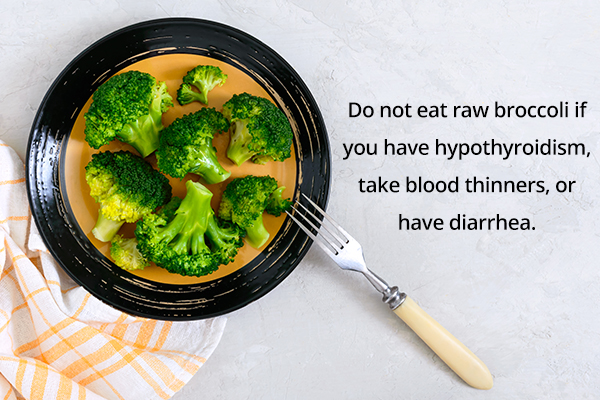
Do not eat raw broccoli if you have hypothyroidism, take blood thinners, or have diarrhea.
How do I know my broccoli is ready to eat?
The florets of broccoli should be a uniform green color. If you notice discoloration or patchiness, then your broccoli may have started to spoil. White or black fuzz in broccoli indicates growth of mold, making broccoli unsafe for consumption.
Final Word
Broccoli is a cruciferous vegetable containing several nutrients beneficial for health. Its many proclaimed uses and benefits are thanks to sulforaphanes and other antioxidant compounds that aid and support many human functions.
It is crucial to remember that foods are preventative and not curative. Therefore, consuming any food with the intent of treating or healing a disease or condition can be damaging to health. Natural foods are to be included in the diet as part of an overall healthy meal plan and not as medicine.
- Was this article helpful?
- YES, THANKS!NOT REALLY


